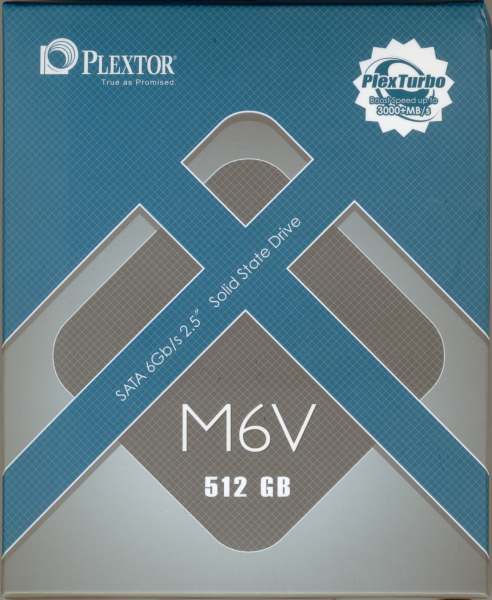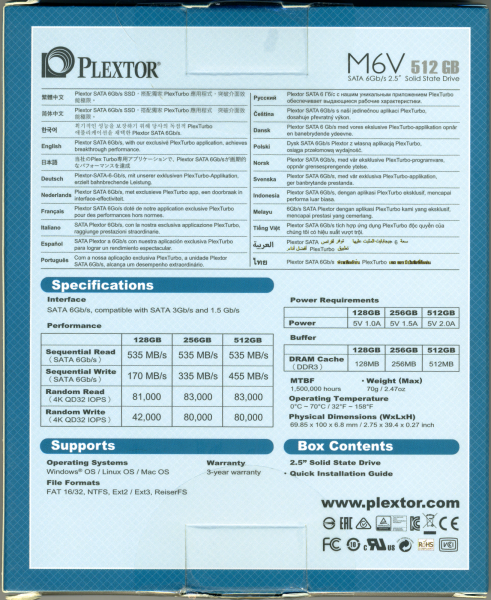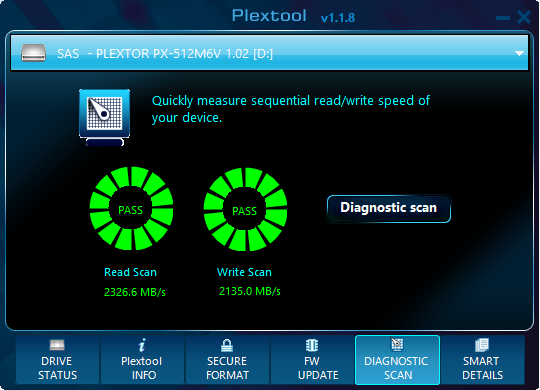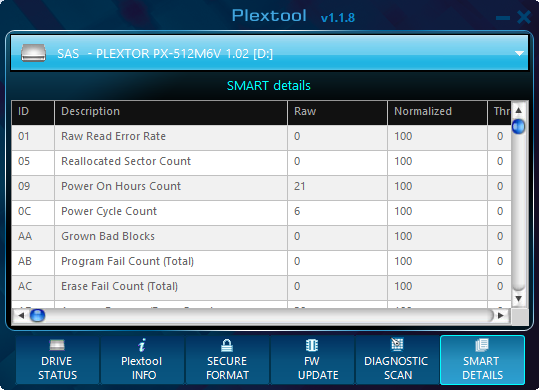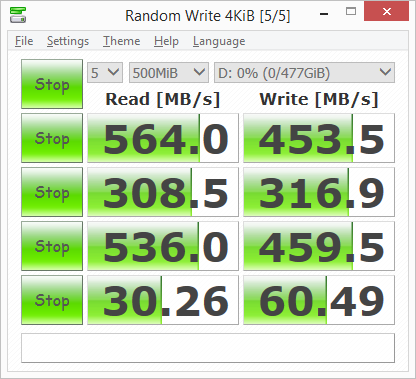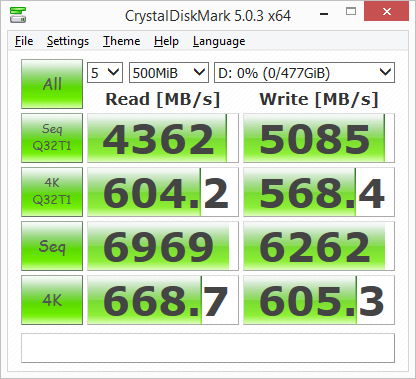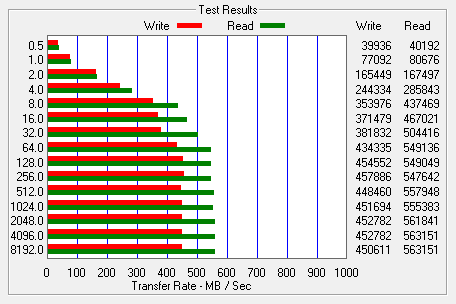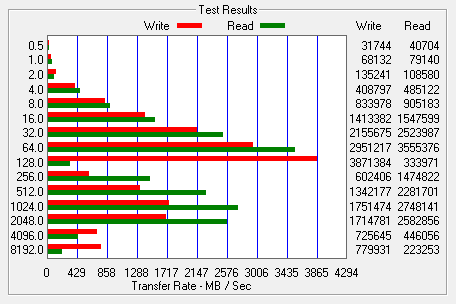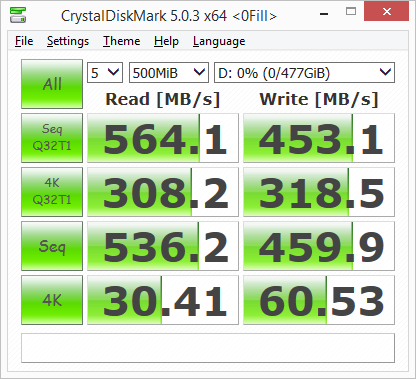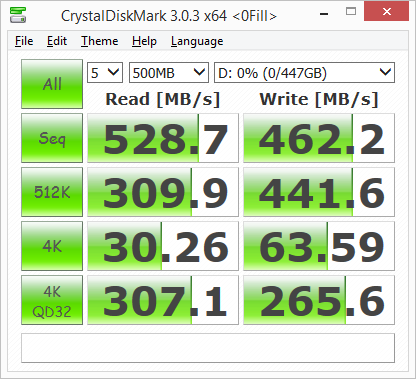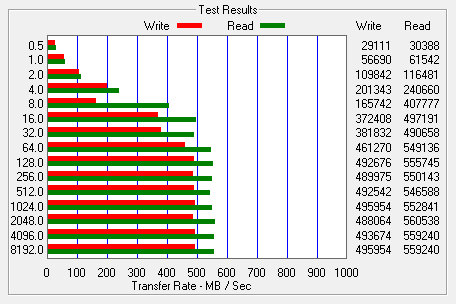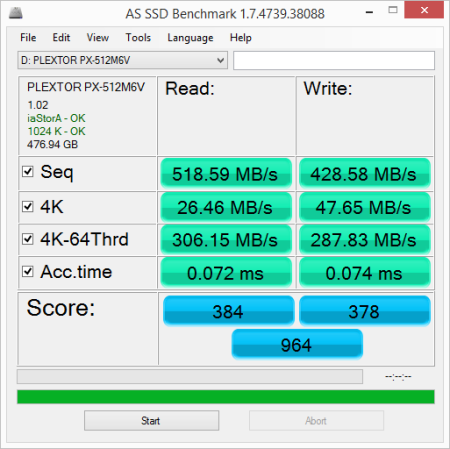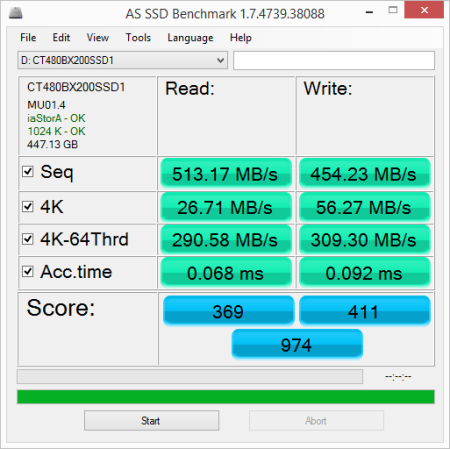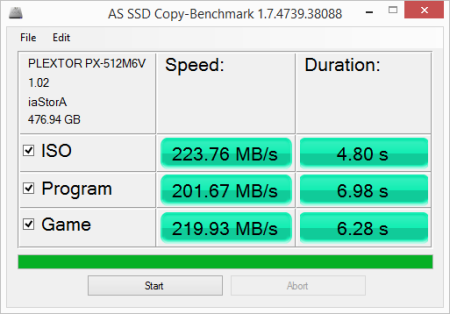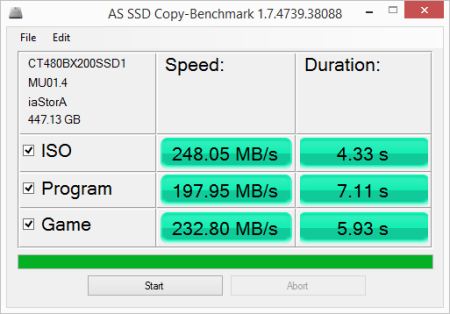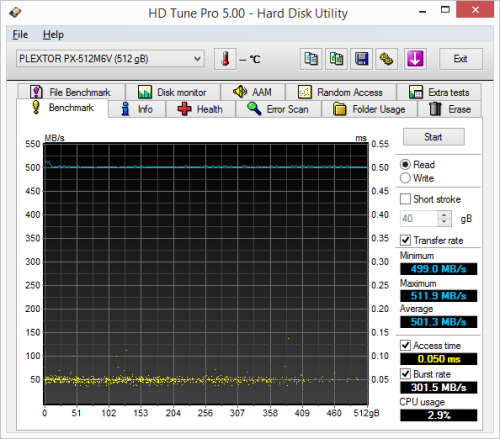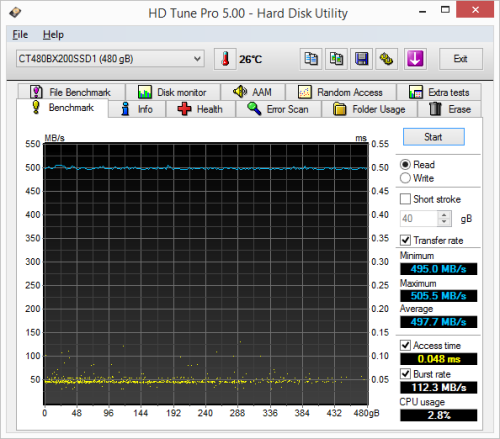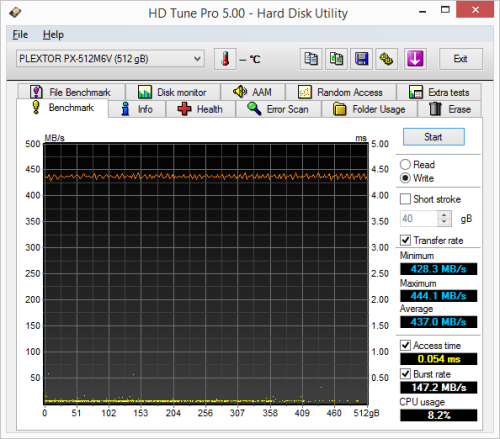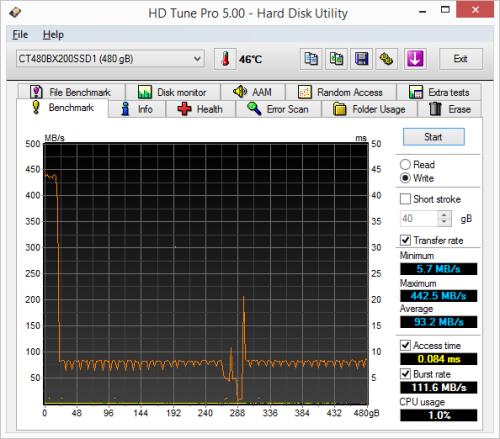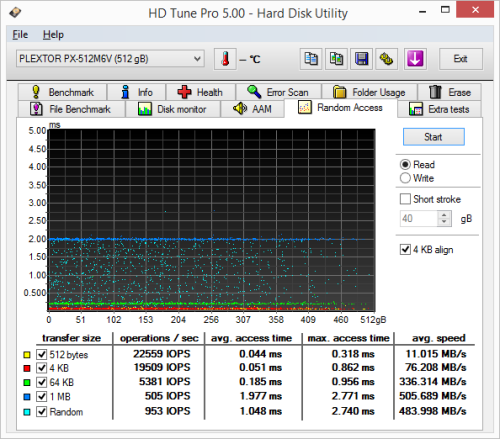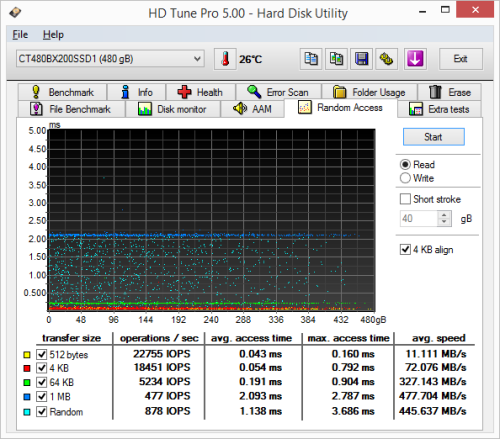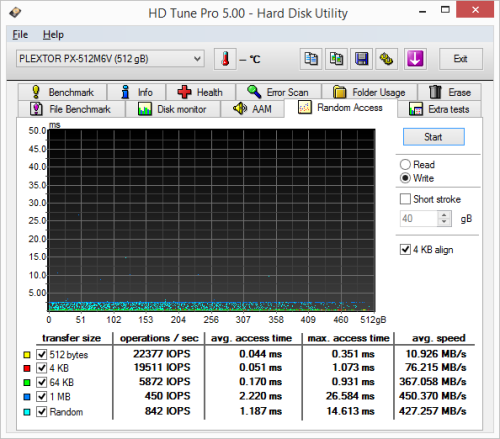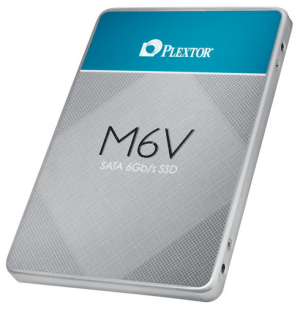

Model: Plextor M6V 512GB Solid State Drive
Manufacturer: Plextor
Provided By: Plextor LLC
As one of the biggest names in the storage industry, Plextor doesn't need much of an introduction. For more than a decade, they've produced some of the best optical drives the industry has seen. Known the world over for their quality, performance, and features, these drives have become favorites among consumers and professionals alike. Today, Plextor continues to lead the way by bringing cutting edge storage technologies to market. Along with a vast assortment of high-performance DVD and Blu-ray drives, the company offers NAS devices, external hard drives and a growing number of solid state drives.
 At this year's Computex show, Plextor launched its new V series SSDs. Along with the mSATA M6MV and M.2 M6GV, this multi-form factor lineup includes the company's latest 2.5-inch SSD, the M6V. This new mainstream SSD is powered by Silicon Motion's SM2246EN controller and is equipped with Toshiba's 15nm Toggle Mode MLC NAND to provide up to 535 MB/s read and 455 MB/s write speeds. The M6V also features Plextor's exclusive PlexTurbo smart caching technology, which uses system RAM to extend the drive's lifespan and push its performance beyond the bandwidth limitations of the SATA interface.
At this year's Computex show, Plextor launched its new V series SSDs. Along with the mSATA M6MV and M.2 M6GV, this multi-form factor lineup includes the company's latest 2.5-inch SSD, the M6V. This new mainstream SSD is powered by Silicon Motion's SM2246EN controller and is equipped with Toshiba's 15nm Toggle Mode MLC NAND to provide up to 535 MB/s read and 455 MB/s write speeds. The M6V also features Plextor's exclusive PlexTurbo smart caching technology, which uses system RAM to extend the drive's lifespan and push its performance beyond the bandwidth limitations of the SATA interface.
The M6V is available in 128GB, 256GB and 512GB capacities. For this review, Plextor sent us the 512GB version of the drive which is capable of delivering up to 535 MB/s sequential read and 455 MB/s sequential write speeds as well as up to 83,000 random read and 80,000 random write IOPS.
| Plextor M6V 512GB Solid State Drive | |||||||||||||||||||||||||||||||||||||||
General Specifications
Performance
Environment and Reliability
Dimensions and Weight
Other Features
|
Needless to say, this is only a taste of what the M6V has to offer. To give you an idea of what to expect, we'll take a closer look at Plextor's new SSD and then see how well it performs. Does the M6V have what it takes? More importantly, is it the best bang for your buck? Keep reading as we find out.
The M6V comes in a small, blue and gray box. The front advertises key features like the drive's 512GB capacity, SATA 6Gbps interface and support for Plextor's PlexTurbo technology. The back of the box provides a bit more information, including the M6V's specifications and box contents.

Plextor doesn't include a lot of extras with the M6V. Aside from the SSD, the only other thing in the box is a small, fold out guide containing warranty information as well as some brief installation instructions for both desktop and notebook computers in a number of different languages.
Physical Features:
Like Plextor's previous SSDs, the M6V is very well constructed. The drive's outer casing is made entirely out of metal and is both strong and lightweight. The top of the drive also has a large, blue and gray sticker showing that it is part of Plextor's M6V series.


As I mentioned earlier, the M6V uses Silicon Motion's SM2246EN controller. The SM2246EN is powered by a 32-bit RISC CPU and supports four NAND flash channels with up to 8 Chip Selects per channel. The controller also offers support for 256-bit encryption, the TCG Opal protocol and DEVSLP, but, for whatever reason, these features are not enabled on the M6V.


For the 480GB version of the M6V, Plextor has opted to use Toshiba's 15nm Toggle Mode MLC NAND flash. Looking at the pictures above, you can see that there are eight 32GB NAND flash packages on either side of the PCB. The drive also has a single 512MB SK hynix LPDDR3 memory chip that is used for caching.
Like the M6S and M6 Pro, the new M6V works with Plextor's Plextool software. Designed exclusively for Plextor SSDs, this free downloadable tool lets users check the status of their drive. From the main screen, users can view information like the overall health, total capacity, free space and firmware version of each drive.
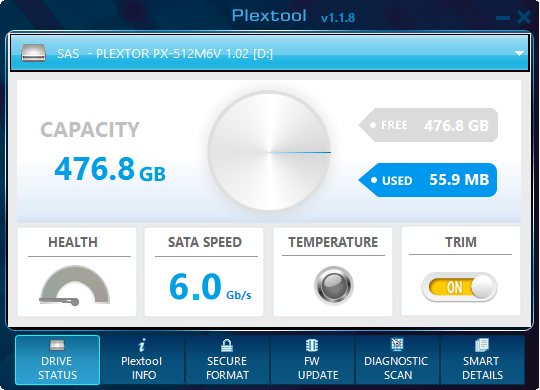
The Secure Format feature gives users the option to delete all the data on an SSD in a way that it can never be recovered, restoring the drive to its original performance.
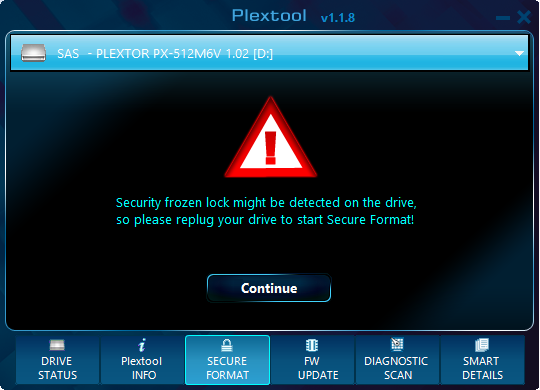
Plextool also gives users the ability to update a drive's firmware, perform a diagnostic scan and check its S.M.A.R.T. details and see if there are any issues.
The M6V also supports Plextor's PlexTurbo technology. Available as a separate download, this smart caching software uses system RAM to prolong the life of the drive and push its performance beyond the bandwidth limitations of the SATA interface.
Once installed, you can monitor PlexTurbo using the Viewer. This utility runs in the system tray, showing which disks Plextool is enabled on as well as the current cache capacity and the total reduced write volume. The reduced write volume is proportional to the extension of the drive's lifespan.
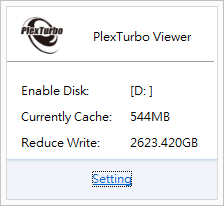
With the latest version of PlexTurbo, you can set the maximum cache size and the cache release time. You can also have it preload data files that were used immediately prior to the last shutdown and automatically run the Viewer after start up.
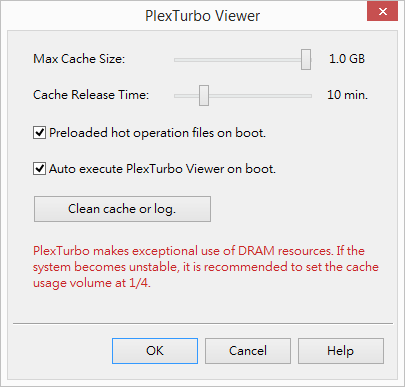
By default, PlexTurbo uses anywhere from 1/4 to 1/2 of your system memory. With the M6 Pro and M6e, the maximum amount of memory it can use is 16GB. However, with the M6V, this number is capped at 1GB. Even with this limitation, we saw some considerable gains in our tests. When tested with CrystalDiskMark and ATTO, sequential read and write speeds increased, in some cases, by more than 7x.
The test system used in this review was an HP 8200 Elite. The computer came equipped with an Intel Core i5-2400 CPU, 4GB of DDR3 1333MHz memory, Seagate Barracuda 7200.12 ST3250312AS 250GB SATA 6 Gb/s hard drive, NVIDIA Quadro FX580 512MB PCIe graphics card and an Intel 82579-LM gigabit network card. For the operating system, I installed a fresh copy of Windows 8.1 Enterprise.
To test the performance of Plextor's M6V SSD, I ran a series of benchmarks using CrystalDiskMark 3.0.1, HD Tach RW 3.0.4.0, ATTO Disk Benchmark 2.46, AS SSD, HD Tune Pro 5.00, Anvil's Storage Utilities, Iometer and PCMark 8. For comparison, I've also included test results from the Crucial BX200, OCZ Trion 100, Kingston HyperX Savage, Crucial MX200, OCZ Vector 180, Kingston BX100, Samsung 850 EVO M.2, Samsung 850 EVO mSATA, AMD Radeon R7, Silicon Power Slim S80, Samsung SSD 850 EVO, OCZ ARC 100, SanDisk Ultra II, Kingston MX100, SanDisk Extreme Pro, Samsung SSD 850 PRO, Plextor PX-256M6S and Toshiba Q Series Pro..

As I mentioned earlier, the M6V is based on Silicon Motion's SM2246EN controller chip. Looking at the screenshot above, you can see that it performs equally well with both incompressible (0%) and compressible (100%) data.
CrystalDiskMark 3.0.3:
First, I ran a few quick tests using CrystalDiskMark. This benchmark tool measures the performance of a storage device by testing its sequential read and write speeds as well as its random read and write speeds using blocks 512K and 4K in size.
According to Plextor, the 512GB M6V is capable of reading at 535 MB/s and writing at 455 MB/s when connected to a SATA 6 Gb/s port. While the drive performed better than expected when reading, it came up a bit short in CrystalDiskMark's sequential read speed test.
The M6V performed equally well when using highly compressible 0x00 (0 Fill) data. This time around, the drive was able to read at 564.1 MB/s and write at 453.1 MB/s.
HD Tach RW 3.0.4.0:
Next, I used HD Tach to test the M6V's read, write and burst speeds as well as its seek times and CPU usage.

Looking at the screenshot above, you can see that the M6V had average read and write speeds of 391.7 MB/s and 339.5 MB/s respectively, as well as a burst speed of 366.9 MB/s.
ATTO Disk Benchmark 2.46:
I also used ATTO Disk Benchmark to test the M6V's sequential read and write speeds. The tests are run using blocks ranging in size from 0.5KB to 8192KB and the total length set to 256MB.
When tested with ATTO, the M6V's read speeds topped out at about 563 MB/s and its write speeds at 457 MB/s.
AS SSD:
AS SSD is a relatively new benchmark designed specifically for solid state drives. The application contains five synthetic tests used to determine the sequential and random read and write performance of a drive.
AS SSD also includes a copy benchmark. This test copies an ISO (two large files), program (many small files) and game (small and large files), returning the speed and duration of each.
HD Tune Pro 5.00:
Next, I ran a series of tests using HD Tune Pro. This hard disk utility measures a drive's performance by testing its sequential read and write speeds as well as its access time, burst rate and CPU usage. For this review, I'm also going to use it to benchmark the M6V's random read and write speeds, random access times and the number of operations per second.
The M6V performed fairly well when benchmarked with HD Tune. The drive had average read and write speeds of 501.3 MB/s and 437.0 MB/s, respectively, and a burst rate of 301.5 MB/s when reading.
The M6V didn't disappoint when doing random reads and writes. When reading 4KB blocks, the drive reached 19,509 IOPS and had an average speed of 76.208 MB/s. The drive was slightly faster when writing, reaching 19,511 IOPS with an average speed of 76.215 MB/s.
Anvil's Storage Utilities:
Anvil's Storage Utilities is another new benchmark designed with SSDs in mind. The standard storage benchmark measures a drive's performance by testing its transfer speeds, access times and IOPS.

Iometer:
Lastly, I ran a series of tests using Iometer. This tool can be configured to benchmark a number of things. In this case, I used it to measure the M6V's read and write speeds and the number of operations per second. The tests were run using random bytes and a queue depth of 3.
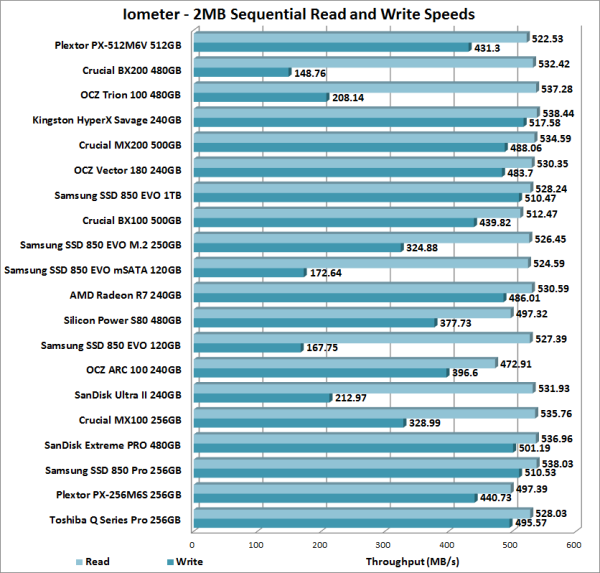
The M6V's performance was very similar to what we saw in our other tests. The drive was able to read at 522.53 MB/s and write at 431.3 MB/s.
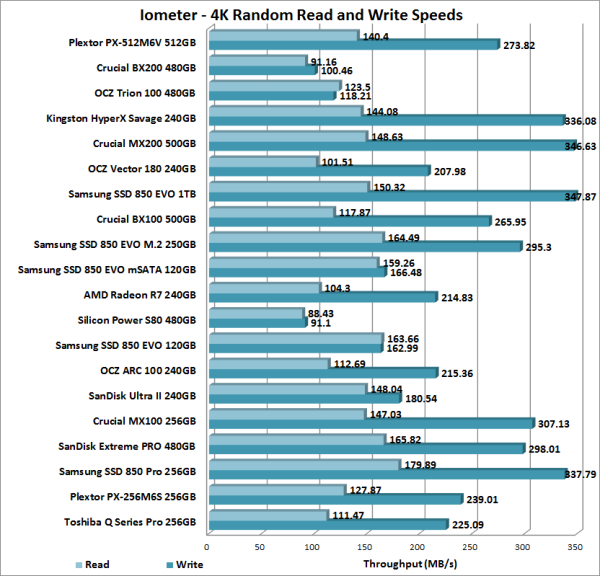
The M6V also performed relatively well when doing random reads and writes. In our tests, the drive was able to read at 140.4 MB/s and write at 273.82 MB/s.
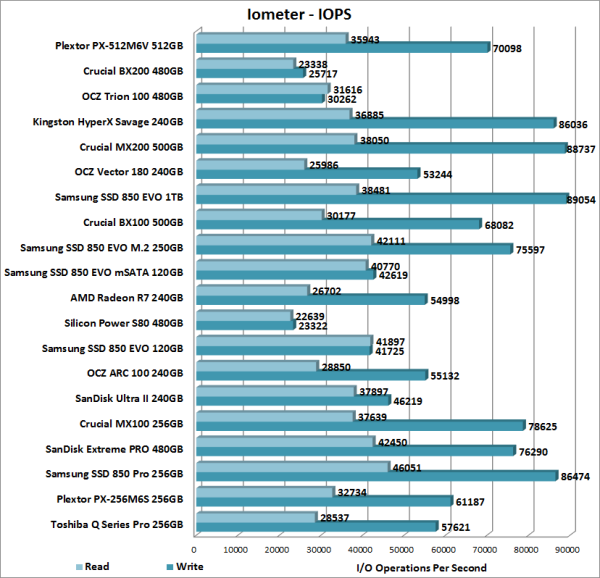
According to Plextor, the 480GB M6V is capable of 83,000 IOPS when reading and 80,000 IOPS when writing 4K blocks. In our tests, the drive reached 35,943 random read IOPS and 70,098 random write IOPS. As with most drives, the M6V performed better at higher queue depths. With the queue depth set to 32, it reached 78,586 random read IOPS and 79,108 random write IOPS.
Vantage PCMark 8 - Storage Test:
PCMark 8 is a complete benchmark for Windows. It includes five benchmark tests, each designed around a specific scenario. The storage benchmark measures drive performance using real-world traces recorded from Adobe Creative Suite, Microsoft Office and a selection of popular games.

PCMark 8 also includes a consistency test which measures the performance consistency and degradation tendency of a storage system. The test reports the performance level at the start, the degraded steady-state and the recovered state as well as the number of iterations required to reach them. For this test, we are focusing on the Adobe Photoshop (Heavy) trace and will look at both the bandwidth and latency of the drive

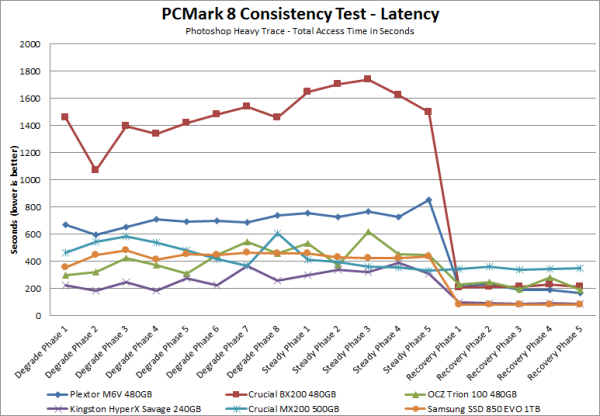
The M6V didn't do as well as some of the other drives in this test. During the degradation and steady phases, its bandwidth dropped below the 50 MB/s. The M6V's performance increased some during the recovery phase, topping out at about 188 MB/s.
TRIM Performance:
While SSD's offer many benefits, there are some downsides to using flash memory. One of the biggest issues people run into is performance degradation. Over time, an SSD will run out of fresh blocks and will have to write over data the file system has marked as deleted. This procedure is very complicated and can slow an SSD's write speeds considerably.
To fix this problem, most manufacturers have added TRIM support to their SSDs. The TRIM command allows an operating system, such as Windows 7, to tell an SSD which data blocks are no longer in use. Using this information, the drive pro-actively erases these blocks and adds them to the free block pool.
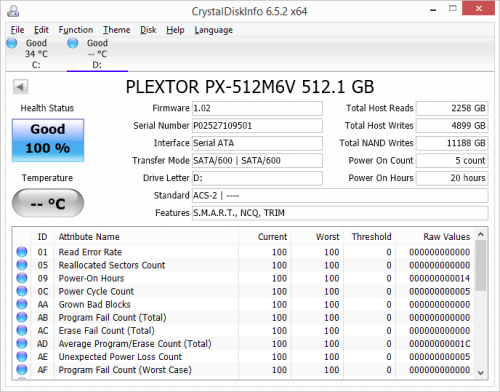
To test the M6V's TRIM and garbage collection functions, I first put the drive in a "dirty" state. I used Iometer to fill the entire drive and then ran a random write test for 30 minutes. This had little impact on the M6V's read speed. However, its average writing speed dropped to 190.4 MB/s.
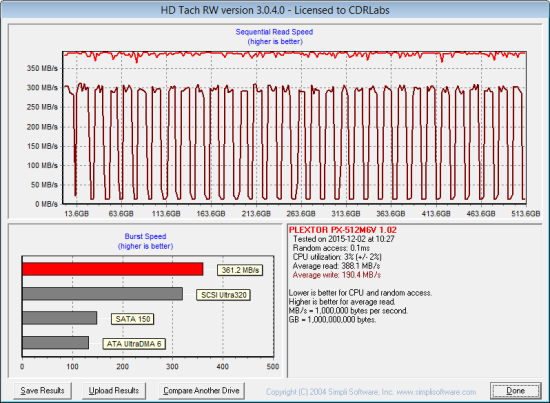
Plextor M6V - Dirty
To see how well the M6V could recover, I let the computer sit for about 45 minutes and then reran the test. The drive wasn't able to reach the factory fresh performance shown in our earlier tests. However, its average write speed climbed up to 293.1 MB/s.
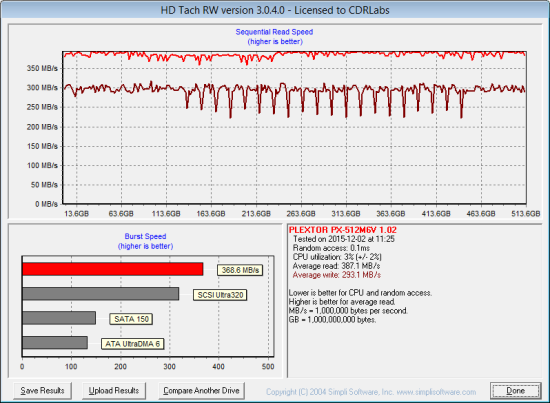
Plextor M6V - After TRIM
Lastly, I used Plextor's Plextool software to perform a secure format on the M6V. With the drive wiped clean, it had average read and write speeds of 392.3 MB/s and 304.2 MB/s, respectively.
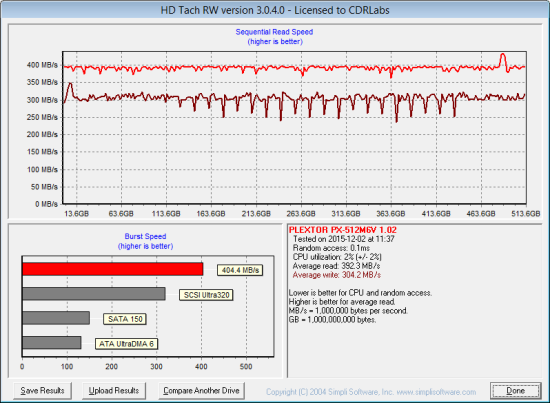
Plextor M6V - Secure Erased
Final Thoughts:
As Plextor themselves point out, the M6V isn't the fastest SSD on the market. Instead, the drive was designed to provide the best possible value to the average consumer. And, by combining Silicon Motion's SM2246EN controller with Toshiba's 15nm Toggle Mode MLC NAND, the M6V is able to deliver a fast and responsive computing experience at a price that won't break the bank. In our sequential read and write tests, the 512GB version of the M6V was able to read at speeds as high as 564 MB/s and write at speeds in excess of 453 MB/s. It also did surprisingly well in our random write tests, producing more than 70,000 IOPS at low queue depths. This is better than what we've seen with most budget-priced SSDs. However, it wasn't enough to top the Samsung 850 EVO.
With its lower price tag, it shouldn't be too surprising that the M6V's feature set isn't as extensive as Plextor's other SSDs. The drive is compatible with the company's Plextool software and comes equipped with their PlexTurbo smart cache technology, but lacks support for things like PlexVault and PlexCompressor. The M6V doesn't offer support for Device Sleep (DEVSLP) or hardware based encryption either. This probably isn't an issue if you're looking for an SSD for your desktop computer. However, these are things you may want to consider if the M6V is going in a laptop or if data security is a concern.
The M6V is available now in 128GB, 256GB and 512GB capacities. Prices on Amazon.com currently range from about $65 up to $177 for the 512GB version reviewed here.

Highs:
- Available in 128GB, 256GB and 512GB capacities
- Good sequential and random read and write performance
- Performs equally well with compressible and incompressible data
- Supports PlexTurbo caching technology
- SATA 6Gb/s interface
- Toggle Mode MLC NAND flash
- Supports TRIM, SMART and NCQ
- Ultra-slim form factor
- 3 year warranty
- Affordably priced
Lows:
- Does not support DEVSLP
- Does not support hardware based encryption
- Lower capacity drives have slower sequential write speeds
